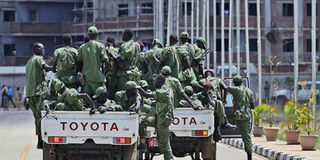South Sudan soldiers quit to try their luck in business

Sudan Peoples Liberation Movement in Opposition (SPLM-IO) soldiers loyal to rebel leader Riek Machar sit in vehicle at the airport in Juba on April 20, 2016. Most businesses in Juba are owned by army deserters or former civil servants. PHOTO | CARL DE SOUZA | AFP
What you need to know:
- South Sudan soldiers are most affected by salary delays even as the administration in Juba announced a $300 million budget in the 2017/2018 fiscal to honour the monthly pay.
- Mr Mayar revealed that as a Sergeant he used to earn an equivalent of $20 (Ksh2,000) amid economic volatility in the country.
- A spot-check by Xinhua revealed that most of the current small businesses being run around the city is either owned by some of the army deserters or civil servants that resigned from their jobs.
JUBA, Wednesday
Abraham Lual Mayar, a veteran South Sudanese soldier, decided to quit the disciplined forces citing meagre perks that confined him to poverty for many years.
Despite his sterling performance in the military, Mayar felt that his sacrifices were not appreciated and after soul-searching, he opted for a civilian life in search of new opportunities.
During a recent interview with Xinhua, the 38-year-old said he has never regretted the decision to quit the army and is now contented in his new life as an entrepreneur where a financial windfall is guaranteed.
“My monthly salary was too meagre and could not sustain me and my family. I survived on loans that weighed down on my savings and sometimes it was hard to meet basic obligations like feeding and educating my children,” said Mayar.
South Sudan soldiers are most affected by salary delays even as the administration in Juba announced a $300 million budget in the 2017/2018 fiscal to honour the monthly pay.
Mr Mayar revealed that as a Sergeant he used to earn an equivalent of $20 (Ksh2,000) amid economic volatility in the country.
INFORMATION TECHNOLOGY
The ex-soldier joined the army in 2005 before South Sudan seceded from Khartoum after having graduated from polytechnic in Uganda as an engineer with basic knowledge in information technology.
He was trained in handling artillery by Sudan People’s Liberation Army (SPLA).
He said that he opened his first business initiative in Yei River State in western part of the country near the border with Uganda and the Democratic Republic of the Congo (DRC) before the renewed clashes of July 2016.
“I rented a small shop and started computer programming to earn daily wages. Currently, I’m involved in installing applications to personal computers,” said Mr Mayar.
He told Xinhua he started to pick up well with the business after the renewed clashes that erupted in July 2016 nearly ended his venture.
He later fled Yei to Juba where he ventured into the hotel business. “My previous business helped me buy a refrigerator and open a cafeteria in Juba. Currently, I sell all types of juice, fresh milk and clean drinking water at affordable prices.
BUSINESS
With this business I earn 350 dollars per month,” Mr Mayar told Xinhua.
He revealed he has employed two women that now earn 50 dollars every month to help meet the needs of their families.
John Aleu, a former Military Intelligence (MI) personnel, told Xinhua that government employees quit their jobs due to low salary which they said cannot meet their daily needs. “I left my job as a security officer and later opened a small business to sustain my life after discovering that being in uniform is not helping,” Aleu told Xinhua.
He graduated from Juba University with a Bachelor’s degree in Mass Communication. He said he joined the army to serve the nation diligently, but unfortunately could not see his ambition come true due to lack of support from the government.
ARMY DESERTERS
A spot-check by Xinhua revealed that most of the current small businesses being run around the city is either owned by some of the army deserters or civil servants that resigned from their jobs due to low morale as a result of financial needs.
The dire economic situation in the country has negatively affected the ability of the government to honour its debts, pay salaries, provide services and cater for emergency support for communities affected by conflict, thus exacerbating the already grave humanitarian situation.
South Sudan, the world’s youngest nation, became independent from Sudan in 2011 and since December 2013, it has been mired in turmoil. (Xinhua)





